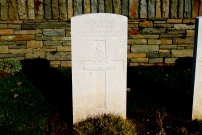| First Name: | Frank Robert | Last Name: | PRIOR | |
|---|---|---|---|---|
| Date of Death: | 06/09/1916 | Lived/Born In: | Dalston | |
| Rank: | Private | Unit: | Devonshire9 | |
| Memorial Site: | ||||
Current Information:Born-Stoke Newington Delville Wood Cemetery, Longueval, Somme
The Battle of the Somme (July-November, 1916) By the beginning of September, 1916, the Battle of the Somme had been raging for two months. Thousands of men had already been killed or wounded or were simply missing, never to be seen again and and just a few square miles of the French countryside, all in the southern part of the battlefield, had been captured from the enemy. Mistakes had been made by the various commanders and would be continued to be made but there was no turning back as the British, Australians, South Africans, New Zealanders and Canadians carried on battering away at the German defences in the hope of a breakthrough, So it continued all the way through to November with nearly every battalion and division then in France being drawn into it at some stage. In the end the German trenches had been pushed back a few more miles along most of the line but the cost in lives had been staggering. By the end of the fighting in November, 1916, British Army casualties numbered over 400,000, killed, wounded and missing. 7th Division had been involved on the Somme in early July, 1916 but by the end of the month they were withdrawn and did not return to the fight until the end of August when they moved into the front line in and to the south of Delville Wood. A great deal of fighting had already taken place here, turning the wood into a hopeless tangle of undergrowth, fallen trees, remains of trenches and dead bodies. Between 3rd – 6th September there was a successful attack on the village of Guillemont which finally fell to troops from 20th and 5th Divisions. At the same time 22 Brigade of 7th Division attacked Ginchy, just to the north of Guillemont, but without success. That night 9th Devonshire of 20 Brigade made their way forward and resumed the attack on the following day, 4th September. Again the attack failed and Ginchy remained in enemy hands. Two days later on 6th September, 20 Brigade tried again. This time 2nd Gordon Highlanders led the attack with 9th Devonshire in support. At 3.30am, 2nd Gordon Highlanders began their advance on Ginchy. They had been heavily shelled overnight and had lost many officers and it is not surprising that their first attack lost direction. A fresh start was made at 5.30am. It had been a wet start to the month and slippery mud slowed them down as they approached the western side of the village. Then the German machine-guns opened up and there was no option but to go to ground. 8th Devonshire, also of 20 Brigade, moved up from their trench (Pilsen Lane) and dug in to form a defensive flank on their left. Their advance parties were pushed back a bit but the general line held. At 2pm, 2nd Gordon Highlanders advanced again after another bombardment with two companies of 9th Devonshire coming in on the right from the direction of the Guillemont-Ginchy road. The attack was made behind a field gun barrage some of which fell short, causing losses. Some parties got into the village and sent back prisoners but the enemy barrage prevented reinforcements moving up and at 4.30pm, a German counter attack forced a withdrawal to the British front line which was then shelled heavily. Among the casualties sustained by 9th Devonshire on 6th September was Frank Prior. |
||||
| « Back to Search Results | ||||
| If you think any of the information shown here is incorrect, Click Here to submit your amends and comments | ||||




